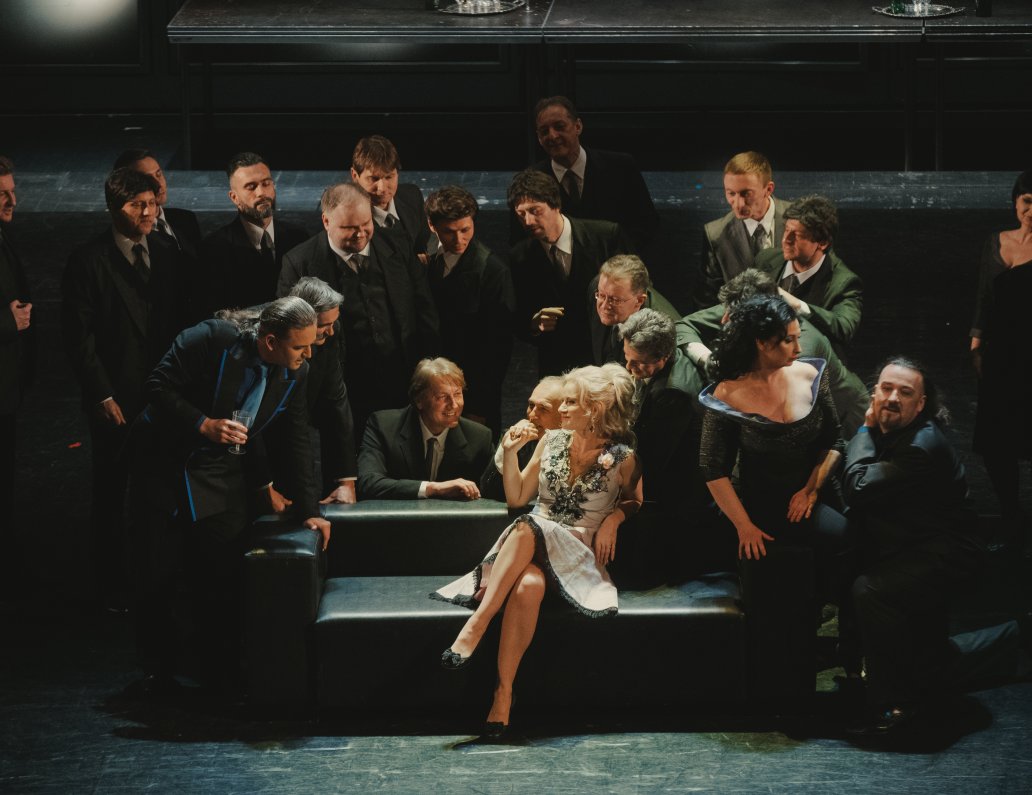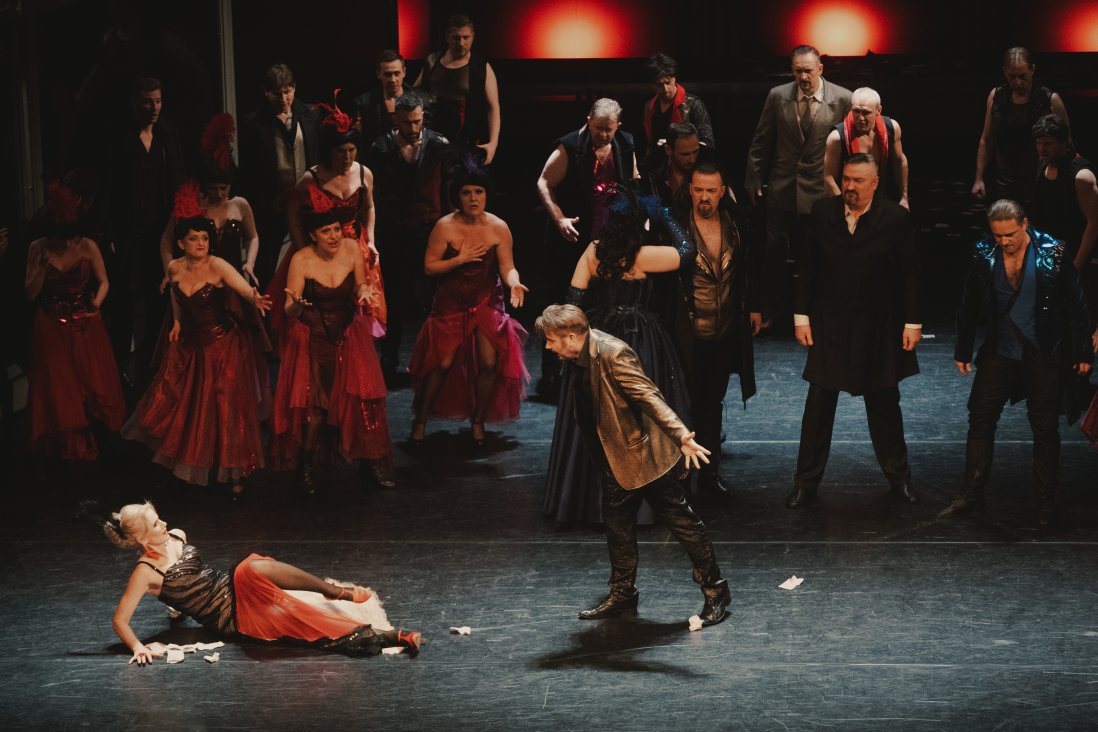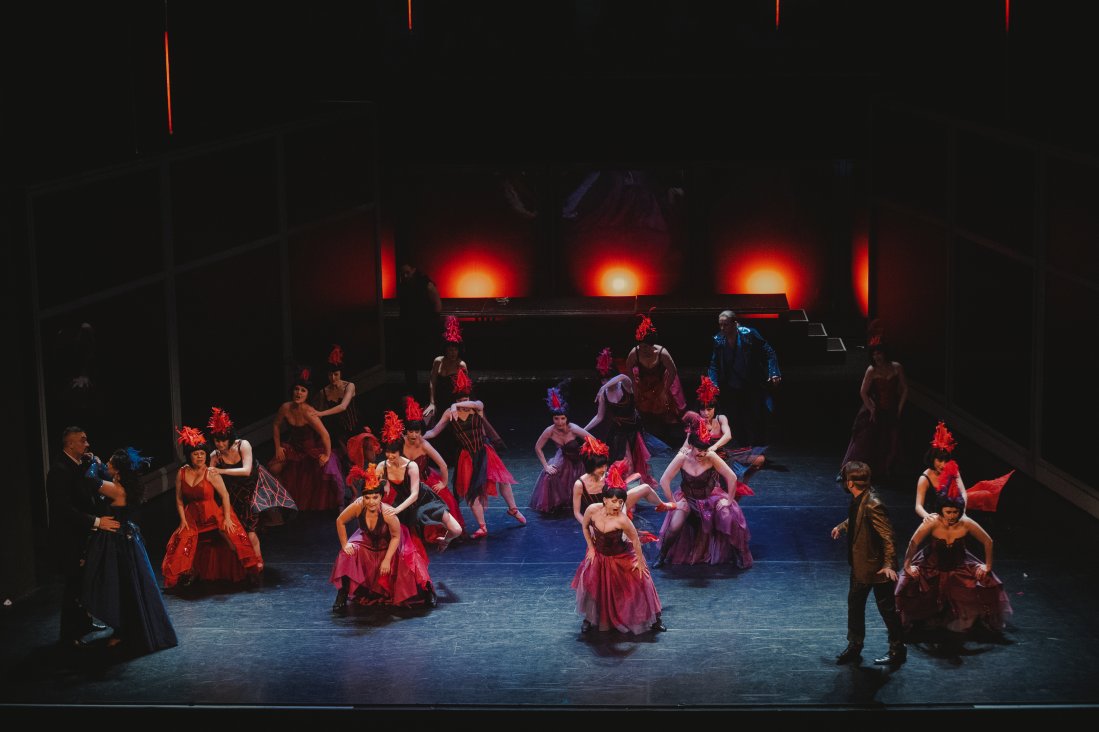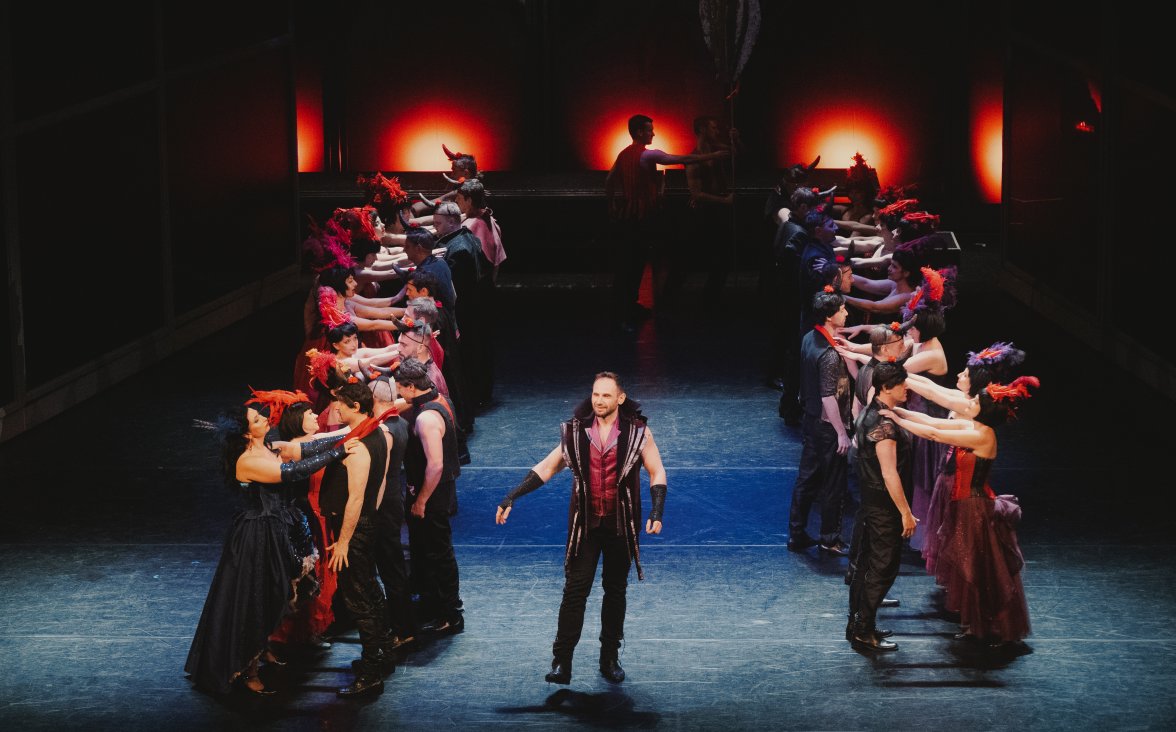
Opera
La Traviata
Opera in three acts
Giuseppe Verdi
Krzysztof Nazar
Tomasz Tokarczyk
Tomasz Tokarczyk
2
hours
45
minutes
details
information
duration
2
hours
45
minutes
|
2
intermissions
composer
Giuseppe Verdi
libretto
Francesco Piave according to Aleksander Dumas novel
World premiere
6 March 1853, Gran Teatro La Fenice, Venice
Polish premiere
27 April 1856, Warsaw
premiere at the Krakow Opera
18 June 2011
language
Sung in the original Italian, with Polish and English surtitles
description
“La Traviata”, based on the novel “The Lady of the Camellias” by Alexandre Dumas, fils, is a story of a fallen woman, a high-class Parisian courtesan and her salvation through a sacrificial offering of love and death. Krzysztof Nazar dispenses with the historical costume and the social context of the plot, focusing instead on the characters’ psychology, emotions and motivations. In his interpretation, Violetta Valéry faces the fact of terminal illness and the inevitability of the end of life. Disillusioned, she decides to enjoy the remaining time to the maximum. But that is exactly when she encounters true love, and with it values that change her vision of the world and people.
The production addresses the theme of love tinged with a sense of passing away, it shows the human strength of character and struggle against the fear of death, it tells a tale of sacrifice and loneliness, of the attitudes and choices we face regardless of times or place.
producers and cast
producers
Director and Producer: Krzysztof Nazar
Music Director: Tomasz Tokarczyk
Set Designer: Marek Braun
Costume Designer: Zofia de Ines
Choreographer: Zofia Rudnicka
Lighting Designer: Mirosław Poznański
Multimedia Projections: Wojciech Kapela
Choir Master: Zygmunt Magiera
Director's Assistant: Agnieszka Sztencel
Music Director’s Assistants: Grzegorz Brajner, Tadeusz Płatek
Set Designer’s Assistant: Magdalena Kurek
Costume Designer’s Assistant: Adam Łucki
Choreographer’s Assistant: Elena Korpusenko
Stage Managers: Anna Jaworska, Magdalena Wąsowska
Prompters: Krystyna Behounek, Dorota Sawka
Soloist Coach: Irena Celińska-Głodek, Kristina Kutnik, Olha Tsymbalyuk
Natalia Wasidlow
Choir Accompanist: Magdalena Kot-Kurek
Ballet Accompanist: Olga Mytnik, Jakub Polaczyk
Displayed libretto translated by Dorota Sawka
Music Director: Tomasz Tokarczyk
Set Designer: Marek Braun
Costume Designer: Zofia de Ines
Choreographer: Zofia Rudnicka
Lighting Designer: Mirosław Poznański
Multimedia Projections: Wojciech Kapela
Choir Master: Zygmunt Magiera
Director's Assistant: Agnieszka Sztencel
Music Director’s Assistants: Grzegorz Brajner, Tadeusz Płatek
Set Designer’s Assistant: Magdalena Kurek
Costume Designer’s Assistant: Adam Łucki
Choreographer’s Assistant: Elena Korpusenko
Stage Managers: Anna Jaworska, Magdalena Wąsowska
Prompters: Krystyna Behounek, Dorota Sawka
Soloist Coach: Irena Celińska-Głodek, Kristina Kutnik, Olha Tsymbalyuk
Natalia Wasidlow
Choir Accompanist: Magdalena Kot-Kurek
Ballet Accompanist: Olga Mytnik, Jakub Polaczyk
Displayed libretto translated by Dorota Sawka
cast
VIOLETTA VALÉRY | Edyta Piasecka (11/19 VIII), Anna Wolfinger (12/18/20 VIII)
ALFRED GERMONT | Paweł Skałuba (11/19 VIII), Sławomir Naborczyk (12/18/20 VIII)
GEORGE GERMONT | Leszek Skrla (11/12/19 VIII), Adam Szerszeń (18/20 VIII)
FLORA BERVOIX | Agnieszka Cząstka-Niezgódka
GASTON | Krzysztof Kozarek
BARON DOUPHOL | Michał Kutnik
DOKTOR GRENVIL | Wołodymyr Pańkiw
MARKIZ D'OBIGNY | Sebastian Marszałowicz
DOCTOR'S ASSISTANT | Vadzim Trukhan
ANNINA | Karin Wiktor-Kałucka
Giuseppe | Paweł Szczepanek
Messenger | Jacek Wróbel
Flora's servant | Stanisław Knapik
THE KRAKOW OPERA ORCHESTRA, CHOIR and BALLET
conductor: Ruben Silva
ALFRED GERMONT | Paweł Skałuba (11/19 VIII), Sławomir Naborczyk (12/18/20 VIII)
GEORGE GERMONT | Leszek Skrla (11/12/19 VIII), Adam Szerszeń (18/20 VIII)
FLORA BERVOIX | Agnieszka Cząstka-Niezgódka
GASTON | Krzysztof Kozarek
BARON DOUPHOL | Michał Kutnik
DOKTOR GRENVIL | Wołodymyr Pańkiw
MARKIZ D'OBIGNY | Sebastian Marszałowicz
DOCTOR'S ASSISTANT | Vadzim Trukhan
ANNINA | Karin Wiktor-Kałucka
Giuseppe | Paweł Szczepanek
Messenger | Jacek Wróbel
Flora's servant | Stanisław Knapik
THE KRAKOW OPERA ORCHESTRA, CHOIR and BALLET
conductor: Ruben Silva
ticket
200 zł
170 zł
150 zł
120 zł
100 zł
90 zł
synopsis
ACT I
A party at Violetta’s apartment. Gastone introduces young Germont to the hostess, whom the latter has long wished to meet. He persuades Alfredo to raise a toast, which he does, proposing to drink to love, and Violetta offers a toast to pleasures, because, after all, what would life be without them (Libiamo, libiamo). Then she encourages her guests to dance, although she herself is not feeling well. Alfredo is concerned about her and deplores her to take good care of herself, but Violetta won’t let anyone interfere with her life. Alfredo loves her and believes that the happy day when she loves him back will actually come. All Violetta is willing to promise is friendship and advises him to forget her (the duet Un di felice, eterea). As a goodbye, she gives him a camellia and instructs him to come back when the flower has withered. ‘Tomorrow, then,’ replies Alfredo.
At dawn, the guests leave Violetta’s house, and she recalls her conversation with Alfredo. For the first time, someone has given her his feelings; she finds herself unable to fend off this love, and yet she wants to be free and happy, she wants her life to be full of delight. Alfredo’s voice is then heard through the window (Violetta’s aria Sempre libera).
ACT II
A villa outside Paris. Alfredo and Violetta now live together. She is entirely changed, and he is happy to see her so joyous (the aria De’miei bollenti spiriti). The idyllic scene is disturbed by Annina’s return from Paris. Violetta has secretly instructed her to sell everything that could be liquidated. Alfredo, who has been unaware of Violetta’s financial problems, resolves to go to Paris himself to raise some funds.
While Alfredo is away, his father, Giorgio Germont, arrives. He tells Violetta that her relationship with his son is ruining both Alfredo’s life and that of his sister who wishes to marry a young gentleman but their engagement will be broken if Alfredo does not return to his family. Germont expects Violetta to renounce her love for ever and refrain from destroying his daughter’s happiness.
In despair, Violetta consents to everything. Germont begins to realize her sacrifice, as she resolves to vanish from Alfredo’s life but, in Germont’s opinion, in order to prevent his son from looking for her, it is necessary to convince him that she has never loved him. Violetta knows that she is going to die soon, so she asks one favour: that Alfredo be told the truth when she is no longer around.
Violetta wants to write a letter to her love, who unexpectedly comes back earlier; he is anxious: his father’s arrival means that he will have to talk to him. He hopes that once his father meets the woman he loves he will grant his consent to their relationship. Violetta believes she should not be present during this meeting. She asks Alfredo to confess his love for her one more time and she departs, crying.
Waiting for his father, Alfredo receives a messenger with a letter from Violetta, in which she informs him that she is leaving him forever. His father tries to convince him to return to his family, who will be his comfort and help him find peace (the aria Di Provenza il mar, il suol), but Alfredo sets off for Paris to look for his love.
Flora Bervoix’s apartment. The hostess is expecting Violetta and Alfredo. Marquis d’Obigny makes her realize she is mistaken as the lovers are no longer a couple, and this time Violetta is going to be accompanied by Baron Douphol. A masquerade begins: the guests are dressed up as Gypsies and Spanish matadors. The mood is disturbed by the arrival of Alfredo, who sits down for a game of cards. Flora warns Violetta that her former lover is here; Baron Douphol demands that she refrain from speaking to him. Alfredo is lucky in the game, and he provokes the baron with sharp remarks (...). The hostess tries to assuage the situation, inviting the guests to join her at the table. Aside, Violetta implores Alfredo to leave Flora’s house, in fear that the baron might kill him. He, however, is prepared to leave only with her at his side. Violetta refuses, and when confronted with the question whether she loves the baron, she says she does, and on hearing this Alfredo hurls his winnings at her feet, apparently to ‘settle their accounts’, as other guests watch. Unexpectedly, Giorgio Germont arrives, and is outraged at the way his son has insulted Violetta, who still hopes that her love will know one day that her feeling for him was true. Alfredo begins to understand how unfairly he has treated her.
ACT III
Violetta’s flat. She is alone, very ill and broke. Annina is the only person that has not abandoned her. Doctor Grenvil knows that she has only hours to live. Violetta reads a letter from Giorgio Germont. The fuel did take place: Alfredo wounded the baron. His father has confessed the truth to him. Violetta remembers the happy times that will never come back. She senses that death is near (Addio, del passato). The sounds of a Carnival masquerade can be heard through the window. Annina tries to prepare her to receive Alfredo, who arrives to ask her forgiveness; he assures her that they will soon leave Paris together and Violetta will be well again (the duet Parigi, o cara). She, however, wishes to get up and go to church to thank God for his return. Alfredo tries to keep her spirits up; his father, moved by the girl’s noble character, arrives as well. Violetta summons some of her strength for one last time, but there is no rescue for her – she passes away.
Jacek Marczyński, Przewodnik operowy, Świat Książki, Warszawa 2011
reviews
Olga Śmiechowicz, “Teatralia Krakow,” 2011
Performances that give the impression of such incredible precision are truly rare gems. Every move, every sound, every look has its own dedicated area that is used to render it in a defined, particular way.
Marek Zabiegaj and Bogdan Zabiegaj, “New Time,” London, 5 July 2011
Take the time to see a modernized version of “La Traviata” (...) - it is well worth to hear a piece resounding with this universal and timeless truth: thinking about death makes you love life.
upcoming performances of this genre
/


